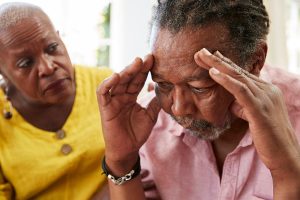WEDNESDAY, Aug. 2, 2023 (American Heart Association News) — Since she was a child, Yanela Vickers has loved babies and the medical field. She dreamed of going into obstetrics and gynecology.
Instead, Yanela got a close look at the profession as a patient. She was 18 and five months pregnant when she walked across the stage to collect her high school diploma in June 2007.
For the past two months, Yanela had felt so fatigued she could hardly get out of bed. Still, she dragged herself to class.
Her abdomen grew at a rate that seemed abnormal and was often painful. Her legs were swollen. She developed high blood pressure and frequently had shortness of breath.
She was seeing her doctor regularly but felt dismissed because she was young and Hispanic. Whenever problems seemed alarming, her boyfriend would take her to the emergency room. Those doctors also explained away her symptoms as being normal during pregnancy.
In her second trimester, Yanela developed migraines and had periodic episodes of fainting.
In her third trimester, during yet another trip to the ER, she was taken to a prepartum triage room. After an ultrasound, she was told to report to the doctor the next day.
“The baby you’re carrying has fetal hydrops,” the doctor told her.
The condition causes swelling due to fluid buildup in a baby’s tissues and organs. In turn, the fluid went into Yanela’s uterus and backed up into her lungs, causing a strain on her heart.
It’s likely the baby won’t survive, the doctor said.
Yanela was transferred to a high-risk pregnancy unit for further testing and was then sent home.
That evening, she and her partner were back in the ER. Her chest was so tight she couldn’t breathe. She was told she was in cardiac failure.
The next day, she delivered her baby girl.
While medication kept Yanela’s heart pumping, the baby was on a ventilator and fluid was being pumped out of her abdominal cavity.
Yanela was wheeled into the room to see her daughter, named Alena. A priest was present. Yanela requested that the resuscitation stop. Alena died shortly thereafter.
Doctors told Yanela she would have to live with cardiomyopathy for the rest of her life. The disease of the heart muscle makes it harder for the heart to pump blood to the rest of the body.
They said her pregnancy likely triggered the disease. Later, she discovered her mother’s side of the family had some heart issues.
“I couldn’t believe all that happened to me in eight months,” Yanela said. “I didn’t think I could be dealt those cards. I was young and naïve.”
Although Yanela hadn’t planned to start having a family so young, she felt despondent that she had lost her first child.
Against the wishes of her doctor and under strict medical supervision, Yanela proceeded to have a family. She gave birth to a daughter in 2009 and a son the following year.
Although Yanela’s heart has strengthened, she still tires quickly. She can walk quickly but not run. She can bicycle, but not push herself. She wears compression stockings to reduce swelling.
She met her husband, Horace Vickers, 10 years ago. He’s been a father to her children since they were young.
Yanela, now 34, lives in Port St. Lucie, Florida, and works in early childhood education. Last year, she became a certified EMT and paramedic, inspired by her heart issue as well as medical challenges her mother faced. She hasn’t decided how to use those skills.
“Going through that training opened a lens to a lot of health disparities,” she said. “I saw the fragility of humanity in a different way. I also feel a different sense of humility toward the heath care field and providers.”
Yanela often speaks at American Heart Association events about maternal health and living with heart problems. She, Horace and her children also participate annually in the AHA’s Palm Beach County Heart Walk, along with friends and family.
Horace is a police officer and is helping the department launch a basic life support program. It’s designed to train first responders before medical personnel arrive. Considering everything Yanela has gone through, he knows how valuable those skills can be.
“Yanela applies so much love in everything she does,” Horace said. “She calls it her ‘heart work.’ Her strength and passion define her as a person. Because of what happened to her, she can relate to so many people, no matter who they are.”
American Heart Association News covers heart and brain health. Not all views expressed in this story reflect the official position of the American Heart Association. Copyright is owned or held by the American Heart Association, Inc., and all rights are reserved.
By Diane Daniel, American Heart Association News
Copyright © 2025 HealthDay. All rights reserved.

















